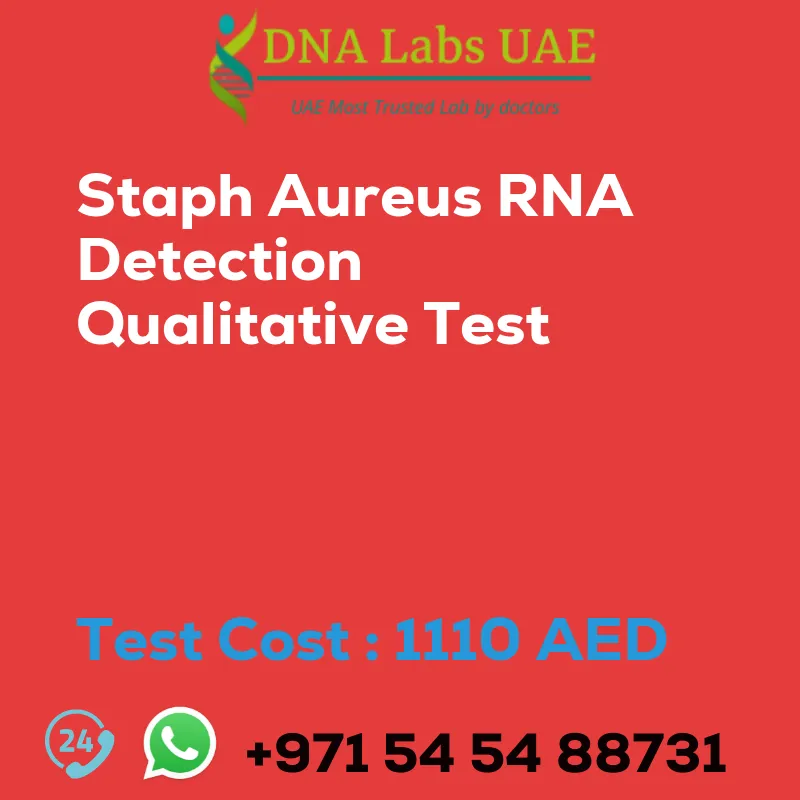Staph Aureus RNA Detection Qualitative Test
Cost: AED 1110.0
Test Name: Staph Aureus RNA Detection Qualitative Test
Components: CSF, whole blood, milk, throat swabs, nasal swabs, tissue biopsies
Report Delivery: 3rd Working Day Email: 36 hours. On phone: 24 hours
Method: Real Time PCR
Test Type: Viral
Doctor: Physician
Test Department: Genetics
Pre Test Information: Need to sign Consent document and bring any clinical history of patient for Staph Aureus (RNA Detection) Qualitative Test
Test Details
The Staph Aureus RNA Detection Qualitative Test is a laboratory test used to detect the presence of Staphylococcus aureus (S. aureus) RNA in a sample. S. aureus is a bacterium that can cause a wide range of infections, from minor skin infections to life-threatening conditions such as pneumonia and sepsis.
The test involves collecting a sample from the suspected site of infection, such as a wound, blood, or respiratory secretions. The sample is then processed in the laboratory to extract the RNA from any bacteria present. RNA is a molecule that carries genetic information and is specific to each type of organism, allowing for the identification of S. aureus.
Once the RNA is extracted, it is subjected to a process called reverse transcription-polymerase chain reaction (RT-PCR). RT-PCR is a technique that amplifies and detects specific RNA sequences. In the case of the Staph Aureus RNA Detection Test, the test is designed to detect RNA sequences that are unique to S. aureus. If the test detects the presence of S. aureus RNA in the sample, it indicates an active infection with this bacterium.
The qualitative test does not provide information about the quantity of bacteria present or the severity of the infection. The Staph Aureus RNA Detection Qualitative Test is commonly used in clinical settings to aid in the diagnosis and management of S. aureus infections. It allows for a rapid and accurate identification of the bacteria, which helps guide appropriate treatment decisions, such as selecting the most effective antibiotics.
It is important to note that this test specifically detects S. aureus RNA and does not detect other types of bacteria or determine antibiotic resistance. Additional tests may be required to determine antibiotic susceptibility and guide treatment further.
| Test Name | Staph Aureus RNA Detection Qualitative Test |
|---|---|
| Components | |
| Price | 1110.0 AED |
| Sample Condition | CSF, whole blood, milk, Throat swabs, Nasal Swabs, Tissue Biopsies |
| Report Delivery | 3rd Working Day Email:-36 hours. On phone: 24 hours |
| Method | Real Time PCR |
| Test type | Viral |
| Doctor | Physician |
| Test Department: | Genetics |
| Pre Test Information | Need to sign Consent document and bring any clinical history of patient forStaph Aureus (RNA Detection) QualitativeTest |
| Test Details |
The Staph Aureus RNA Detection Qualitative Test is a laboratory test used to detect the presence of Staphylococcus aureus (S. aureus) RNA in a sample. S. aureus is a bacterium that can cause a wide range of infections, from minor skin infections to life-threatening conditions such as pneumonia and sepsis. The test involves collecting a sample from the suspected site of infection, such as a wound, blood, or respiratory secretions. The sample is then processed in the laboratory to extract the RNA from any bacteria present. RNA is a molecule that carries genetic information and is specific to each type of organism, allowing for the identification of S. aureus. Once the RNA is extracted, it is subjected to a process called reverse transcription-polymerase chain reaction (RT-PCR). RT-PCR is a technique that amplifies and detects specific RNA sequences. In the case of the Staph Aureus RNA Detection Test, the test is designed to detect RNA sequences that are unique to S. aureus. If the test detects the presence of S. aureus RNA in the sample, it indicates an active infection with this bacterium. The qualitative test does not provide information about the quantity of bacteria present or the severity of the infection. The Staph Aureus RNA Detection Qualitative Test is commonly used in clinical settings to aid in the diagnosis and management of S. aureus infections. It allows for a rapid and accurate identification of the bacteria, which helps guide appropriate treatment decisions, such as selecting the most effective antibiotics. It is important to note that this test specifically detects S. aureus RNA and does not detect other types of bacteria or determine antibiotic resistance. Additional tests may be required to determine antibiotic susceptibility and guide treatment further. |








